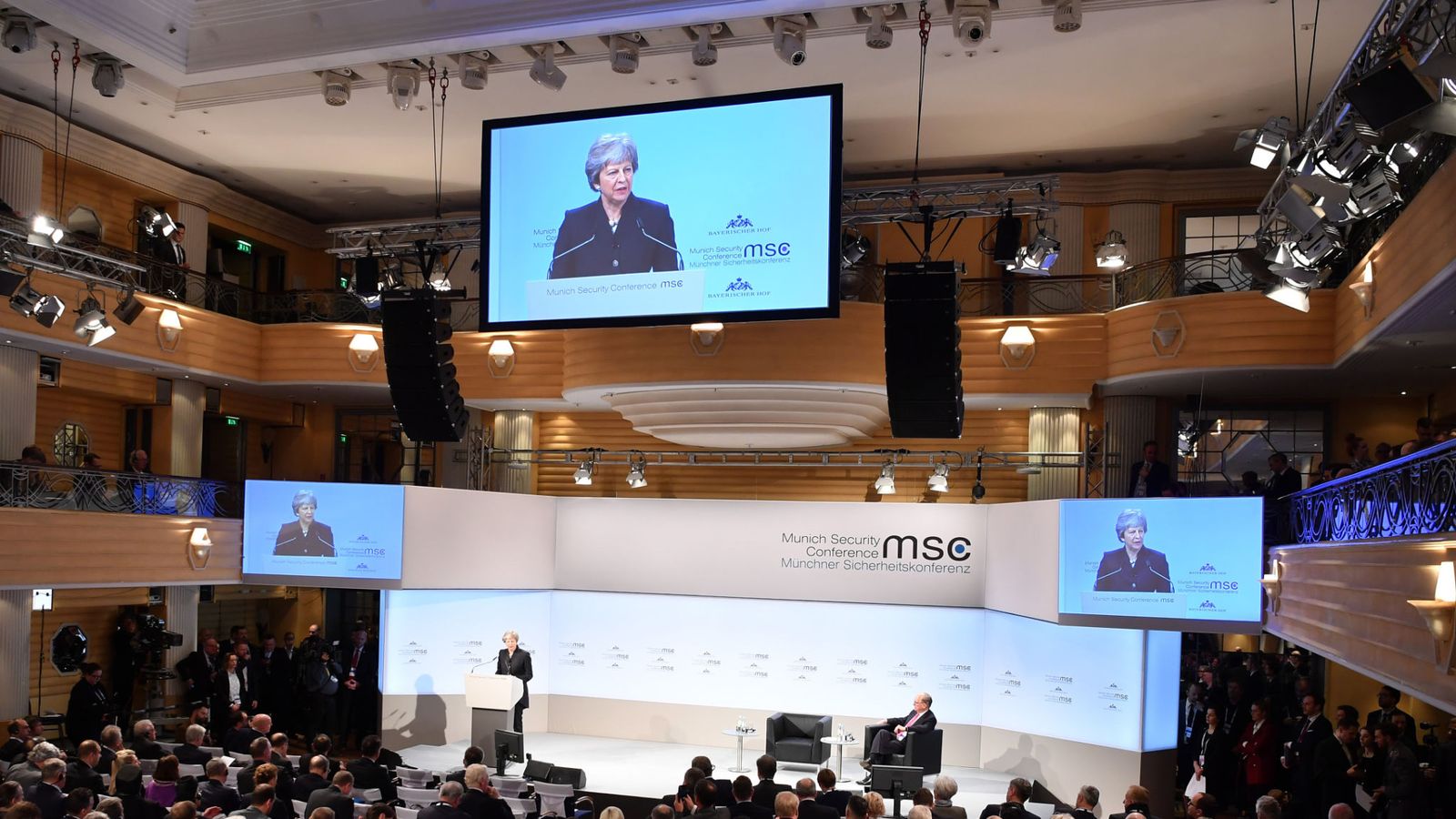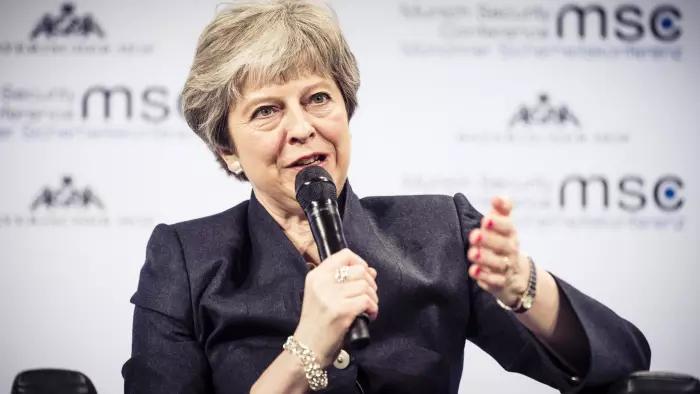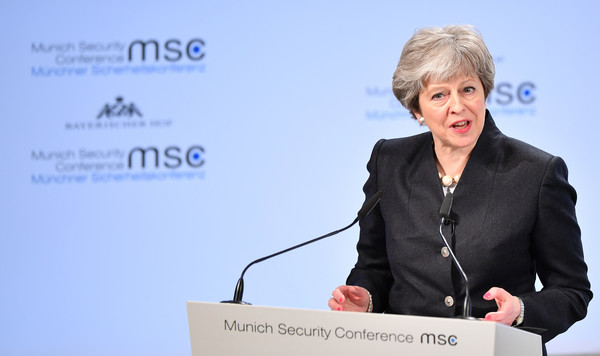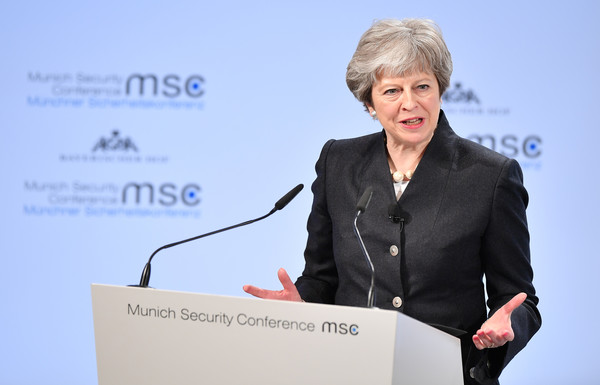英国首相特蕾莎·梅在2018慕尼黑安全会议上演讲
Prime Minister Theresa May's speech at the 2018 Munich Security Conference
编辑:给力英语新闻 更新:2018年2月20日 作者:特蕾莎·梅(Theresa May)

调整语速:
For more than half a century, this conference has brought nations together from Europe and across the Atlantic to forge our common security.
The fundamental values we share - respect for human dignity, human rights, freedom, democracy and equality - have created common cause to act together in our shared interest.
The rules-based system we helped to develop has enabled global cooperation to protect those shared values.
Today as globalisation brings nations closer together than ever before, we face a host of new and growing threats that seek to undermine those rules and values.
As internal and external security become more and more entwined - with hostile networks no longer only rooted in state-based aggression and weapons designed not just to be deployed on the battlefield but through cyberspace - so our ability to keep our people safe depends ever more on working together.
That is reflected here today in the world’s largest gathering of its kind, with representatives of more than seventy countries.
For our part, the United Kingdom has always understood that our security and prosperity is bound to global security and prosperity.
We are a global nation – enriching global prosperity through centuries of trade, through the talents of our people and by exchanging learning and culture with partners across the world.
And we invest in global security knowing this is how we best protect our people at home and abroad.
That is why we are the second largest defence spender in NATO, and the only EU member to spend 2 per cent of our GDP on defence as well as 0.7 per cent of our Gross National Income on international development. And it is why we will continue to meet these commitments.
It is why we have created a highly developed set of security and defence relationships: with the US and Five Eyes partners, with the Gulf and increasingly with Asian partners too.
We have invested in critical capabilities - including our nuclear deterrent, our two new aircraft carriers, our world class special forces and intelligence agencies.
We are a leading contributor to international missions from fighting Daesh in Iraq and Syria to peacekeeping in South Sudan and Cyprus, and NATO missions in Eastern Europe.
And within Europe we are working ever more closely with our European partners, bringing the influence and impact that comes from our full range of global relationships.
And we want to continue this co-operation as we leave the European Union.
The British people took a legitimate democratic decision to bring decision making and accountability closer to home.
But it has always been the case that our security at home is best advanced through global cooperation, working with institutions that support that, including the EU.
Changing the structures by which we work together should not mean we lose sight of our common aim – the protection of our people and the advance of our common interests across the world.
So as we leave the EU and forge a new path for ourselves in the world, the UK is just as committed to Europe’s security in the future as we have been in the past.
Europe’s security is our security. And that is why I have said – and I say again today - that the United Kingdom is unconditionally committed to maintaining it.
The challenge for all of us today is finding the way to work together, through a deep and special partnership between the UK and the EU, to retain the co-operation that we have built and go further in meeting the evolving threats we face together.
This cannot be a time when any of us allow competition between partners, rigid institutional restrictions or deep-seated ideology to inhibit our co-operation and jeopardise the security of our citizens.
We must do whatever is most practical and pragmatic in ensuring our collective security.
Today I want to set out how I believe we can achieve this – taking this opportunity to establish a new security partnership that can keep our people safe, now and in the years ahead.
Safeguarding our internal security

Let me start with how we ensure security within Europe.
The threats we face do not recognise the borders of individual nations or discriminate between them.
We all in this room have shared the pain and heartbreak of terrorist atrocities at home.
It is almost a year since the despicable attack on Westminster, followed by further attacks in Manchester and London.
These people don’t care if they kill and maim Parisians, Berliners, Londoners or Mancunians because it is the common values that we all share which they seek to attack and defeat.
But I say: we will not let them.
When these atrocities occur, people look to us as leaders to provide the response.
We must all ensure that nothing prevents us from fulfilling our first duty as leaders: to protect our citizens.
And we must find the practical ways to ensure the co-operation to do so.
We have done so before.
When Justice and Home Affairs ceased to be intergovernmental and became a shared EU competence, of course there were some in the UK who would have had us adopt the EU’s approach wholesale, just as there were some who would have had us reject it outright.
As Home Secretary, I was determined to find a practical and pragmatic way in which the UK and EU could continue to co-operate on our common security.
That is why I reviewed each provision in turn and successfully made the case for the UK to opt back in to those that were clearly in our national interest.
Through the relationship we have developed, the UK has been at the forefront of shaping the practical and legal arrangements that underpin our internal security co-operation.
And our contribution to those arrangements is vital in protecting European citizens in cities right across our continent.
First our practical co-operation, including our expedited extradition and mutual legal assistance relationship, means wanted or convicted serious criminals - and the evidence to support their convictions - move seamlessly between the UK and EU Member States.
So when a serious terrorist like Zakaria Chadili was found living in the UK - a young man who was believed to have been radicalised in Syria and was wanted for terrorist offences in France - there was no delay in ensuring he was extradited back to France and brought to justice.
He is one of 10,000 people the UK has extradited through the European Arrest Warrant. In fact, for every person arrested on a European Arrest Warrant issued by the UK, the UK arrests eight on European Arrest Warrants issued by other Member States.
The European Arrest Warrant has also played a crucial role in supporting police co-operation between Northern Ireland and Ireland – which has been a fundamental part of the political settlement there.
Second, co-operation between our law enforcement agencies means the UK is one of the biggest contributors of data, information and expertise to Europol. Take for example, Operation Triage where police in the UK worked extensively with Europol and the Czech Republic to crack a trafficking gang involved in labour exploitation.
Third, through the Schengen Information System II, the UK is contributing to the sharing of real-time data on wanted criminals, missing persons and suspected terrorists. About a fifth of all alerts are circulated by the UK, with over 13,000 hits on people and objects of interest to law enforcement across Europe in the last year alone.
The UK has also driven a pan-EU approach to processing passenger data, enabling the identification and tracking of criminals, victims of trafficking and those individuals vulnerable to radicalisation.
In all these areas, people across Europe are safer because of this co-operation and the unique arrangements we have developed between the UK and EU institutions in recent years.
So it is in all our interests to find ways to protect the capabilities which underpin this co-operation when the UK becomes a European country outside the EU but in a new partnership with it.
To make this happen will require real political will on both sides.
I recognise there is no existing security agreement between the EU and a third country that captures the full depth and breadth of our existing relationship.
But there is precedent for comprehensive, strategic relationships between the EU and third countries in other fields, such as trade. And there is no legal or operational reason why such an agreement could not be reached in the area of internal security.
However, if the priority in the negotiations becomes avoiding any kind of new co-operation with a country outside the EU, then this political doctrine and ideology will have damaging real world consequences for the security of all our people, in the UK and the EU.
Let’s be clear about what would happen if the means of this co-operation were abolished.
Extradition under the European Arrest Warrant would cease. Extradition outside the European Arrest Warrant can cost four times as much and take three times as long.
It would mean an end to the significant exchange of data and engagement through Europol.
And it would mean the UK would no longer be able to secure evidence from European partners quickly through the European Investigation Order, with strict deadlines for gathering evidence requested, instead relying on slower, more cumbersome systems.
This would damage us both and would put all our citizens at greater risk.
As leaders, we cannot let that happen.
So we need, together, to demonstrate some real creativity and ambition to enable us to meet the challenges of the future as well as today.
That is why I have proposed a new Treaty to underpin our future internal security relationship.
The Treaty must preserve our operational capabilities. But it must also fulfil three further requirements.
It must be respectful of the sovereignty of both the UK and the EU’s legal orders. So, for example, when participating in EU agencies the UK will respect the remit of the European Court of Justice.
And a principled but pragmatic solution to close legal co-operation will be needed to respect our unique status as a third country with our own sovereign legal order.
As I have said before, we will need to agree a strong and appropriate form of independent dispute resolution across all the areas of our future partnership in which both sides can have the necessary confidence.
We must also recognise the importance of comprehensive and robust data protection arrangements.
The UK’s Data Protection Bill will ensure that we are aligned with the EU framework. But we want to go further and seek a bespoke arrangement to reflect the UK’s exceptionally high standards of data protection. And we envisage an ongoing role for the UK’s Information Commissioner’s Office, which would be beneficial in providing stability and confidence for EU and UK individuals and businesses alike.
And we’re ready to start working through this with colleagues in the European Commission now.
Finally, just as we have been able to develop the agreement on passenger name records in the face of terrorist atrocities in recent years, so the Treaty must have an ability to ensure that as the threats we face change and adapt - as they surely will - our relationship has the capacity to move with them.
Nothing must get in the way of our helping each other in every hour of every day to keep our people safe.
If we put this at the heart of our mission – we can and will find the means.
And we cannot delay discussions on this. EU Member States have been clear how critical it is that we maintain existing operational capabilities.
We must now move with urgency to put in place the Treaty that will protect all European citizens wherever they are in the continent.
External security

But clearly our security interests don’t stop at edge of our continent.
Not only do the threats to our internal security emanate from beyond our borders, as we look at the world today we are also facing profound challenges to the global order: to peace, prosperity, to the rules-based system that underpins our very way of life.
And in the face of these challenges, I believe it is our defining responsibility to come together and reinvigorate the transatlantic partnership - and the full breadth of all our global alliances – so that we can protect our shared security and project our shared values.
The United Kingdom is not only unwavering in its commitment to this partnership, we see reinvigorating it as a fundamental part of our global role as we leave the European Union.
As a Permanent Member of the United Nations Security Council, as a leading contributor to NATO and as America’s closest partner, we have never defined our global outlook primarily through our membership of the European Union or by a collective European foreign policy.
So upon leaving the EU, it is right that the UK will pursue an independent foreign policy.
But around the world, the interests that we will seek to project and defend will continue to be rooted in our shared values.
That is true whether fighting the ideologies of Daesh, developing a new global approach to migration, ensuring the Iranian nuclear deal is properly policed or standing up to Russia’s hostile actions, whether in Ukraine, the Western Balkans or in cyberspace. And in all these cases, our success depends on a breadth of partnership that extends far beyond the institutional mechanisms for cooperation with the EU.
That means doing more to develop bi-lateral co-operation between European nations, as I was pleased to do with President Macron at last month’s UK-France Summit.
It means building the ad hoc groupings which allow us to counter terrorism and hostile state threats, as we do through the 30 strong intergovernmental European Counter Terrorism Group – the largest of its kind in the world.
It means ensuring that a reformed NATO alliance remains the cornerstone of our shared security.
And, critically, it means both Europe and the United States reaffirming our resolve to the collective security of this continent, and to advancing the democratic values on which our interests are founded.
Taken together, it is only by strengthening and deepening this full range of partnerships within Europe and beyond that we will be able to respond together to the evolving threats we face.
So what does this mean for the future security partnership between the UK and the EU?
We need a partnership that respects both the decision-making autonomy of the European Union and the sovereignty of the United Kingdom.
This is fully achievable. The EU’s common foreign policy is distinct within the EU Treaties and our foreign policies will keep evolving. So, there is no reason why we should not agree distinct arrangements for our foreign and defence policy cooperation in the time-limited implementation period, as the Commission has proposed. This would mean that key aspects of our future partnership in this area would already be effective from 2019.
We shouldn’t wait where we don’t need to. In turn, if the EU and its remaining Member States believe that the best means to increase the contribution Europe makes to our collective security is through deeper integration, then the UK will look to work with you. And help you to do so in a way which strengthens NATO and our wider alliances too, as EU leaders have repeatedly made clear.
The partnership that we need to create is therefore one which offers the UK and the EU the means and choice to combine our efforts to the greatest effect - where this is in our shared interest.
To put this into practice so that we meet the threats we all face today and build the capabilities we all need for tomorrow, there are three areas on which we should focus.
First, at a diplomatic level, we should have the means to consult each other regularly on the global challenges we face, and coordinate how we use the levers we hold where our interests align.
In particular, we will want to continue to work closely together on sanctions. We will look to carry over all EU sanctions at the time of our departure. And we will all be stronger if the UK and EU have the means to co-operate on sanctions now and potentially to develop them together in the future.
Second, it is clearly in our shared interests to be able to continue to coordinate and deliver operationally on the ground.
Of course, we will continue to work with and alongside each other.
But where we can both be most effective by the UK deploying its significant capabilities and resources with and indeed through EU mechanisms – we should both be open to that.
On defence, if the UK and EU’s interests can best be furthered by the UK continuing to contributing to an EU operation or mission as we do now, then we should both be open to that.
And similarly, while the UK will decide how we spend the entirety of our foreign aid in the future, if a UK contribution to EU development programmes and instruments can best deliver our mutual interests, we should both be open to that.
But if we are to choose to work together in these ways, the UK must be able to play an appropriate role in shaping our collective actions in these areas.
Third, it will also be in our interests to continue working together on developing the capabilities – in defence, cyber and space - to meet future threats.
The UK spends around 40 per cent of Europe’s total on defence R&D. This investment provides a sizeable stimulus to improve Europe’s competitiveness and capability. And this is to the benefit of us all.
So an open and inclusive approach to European capability development - that fully enables British defence industry to participate - is in our strategic security interests, helping keep European citizens safe and Europe’s defence industries strong.
And Eurofighter Typhoon is a great example of this – a partnership between the UK, Germany, Italy and Spain which has supported over 10,000 highly skilled jobs across Europe.
This is also why the UK wants to agree a future relationship with the European Defence Fund and the European Defence Agency, so that jointly we can research and develop the best future capability that Europe can muster.
Last year’s ‘NotPetya’ cyber-attack showed why we also need to work closely to defend our interests in cyber space.
This reckless attack - which the UK and partners have attributed to Russia - disrupted organisations across Europe costing hundreds of millions of pounds.
To contend with a truly global threat such as this we need a truly global response - with not only the UK and EU, but industry, government, likeminded states and NATO all working together to strengthen our cyber security capabilities.
And as our lives move increasingly online, so we will also become increasingly reliant on space technologies. Space is a domain like any other where hostile actors will seek to threaten us.
So we very much welcome the EU’s efforts to develop Europe’s capabilities in this field. We need to keep open all the options which will enable the UK and the EU to collaborate in the most effective way possible. The UK hosts much of Europe’s cutting edge capabilities on space and we have played a leading role, for example, in the development of the Galileo programme.
We are keen for this to continue as part of our new partnership, but, as is the case more widely, we need to get the right agreements concluded which will allow the UK and its businesses to take part on a fair and open basis.
Conclusion

It was the tragic massacre at the 1972 Olympics here in Munich which subsequently inspired a British Foreign Secretary, Jim Callaghan, to propose an intergovernmental group aimed at co-ordinating European counter terrorism and policing.
At the time this was outside the formal mechanisms of the European Community. But in time, it became the foundations for the co-operation that we have on Justice and Home Affairs today.
Now, as then, we can – and must - think pragmatically and practically to create the arrangements that put the safety of our citizens first.
For ours is a dynamic relationship, not a set of transactions.
A relationship built on an unshakeable commitment to our shared values.
A relationship in which we must all invest if we are to be responsive and adaptive to threats which will emerge perhaps more rapidly than any of us can imagine.
A relationship in which we must all play our full part in keeping our continent safe and free, and reinvigorate the transatlantic alliance and rules based system on which our shared security depends.
Those who threaten our security would like nothing more than to see us fractured.
They would like nothing more than to see us put debates about mechanisms and means ahead of doing what is most practical and effective in keeping our people safe.
So let the message ring out loud and clear today: we will not let that happen.
We will together protect and project our values in the world – and we will keep our people safe - now and in the years to come.
Edited by:https://www.geilien.cn
Thank you